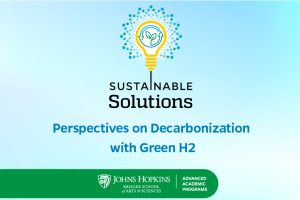Sustainable Solutions: Perspectives on Decarbonization with Green H2
Event Actions
Join Rachel Issacs, Program Coordinator for the MS in Environmental Sciences and Policy and MS in Geographic Information Systems programs, and Parag Nathaney for an engaging discussion on the adoption of Green Hydrogen (H2) as a decarbonization solution for hard-to-abate sections like heavy-duty trucking, steel, and refining.

Nathaney will review other decarbonization alternatives, identify the most competitive applications for green H2, and highlight the need to address gaps from a policy and regulatory perspective to promote green H2 adoption.
Parag Nathaney has amassed a decade of experience in green hydrogen development, wholesale electricity markets, renewable energy, and energy storage. He currently works as Principal Advisor (Power) at Fortescue’s Market Intelligence Team in North America, where his focus is on standing up green hydrogen production to facilities in the U.S. His previous experiences include electricity market modeling to support trading, origination, and policy development for Constellation. As a consultant, he also led commercial due diligence for power portfolio transactions and developed commercial strategies to support energy transition investments for various private equity and financial sector clients. Parag has an MS in Energy and Environmental Policy from University of Delaware and a BS in Engineering from National Institute of Technology (India).
Sustainable Solutions Series Overview
The Sustainable Solutions Speaker Series is presented by the Environmental Sciences and Policy and the Energy Policy and Climate programs at Johns Hopkins University. Each talk features scholars and practitioners working to tackle ‘wicked’ environmental, energy, and climate problems. Speakers take us through how they leverage technology, policy, the private sector, markets, research, and field work to form innovative and lasting solutions. From water insecurity to climate adaptation, natural resource conflict to energy transitions, and food insecurity to sustainable agriculture, this series features the depth and breadth of Johns Hopkins University faculty and our greater community as we work toward a sustainable future.
Learn more about Johns Hopkins Advanced Academic Program’s MS in Environmental Sciences and Policy and MS in Geographic Information Systems degree programs.